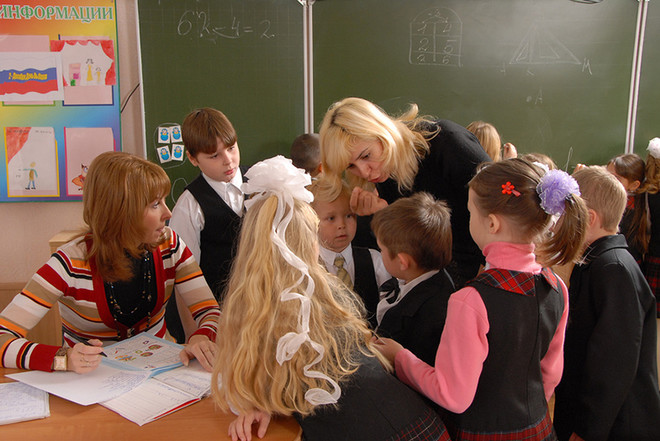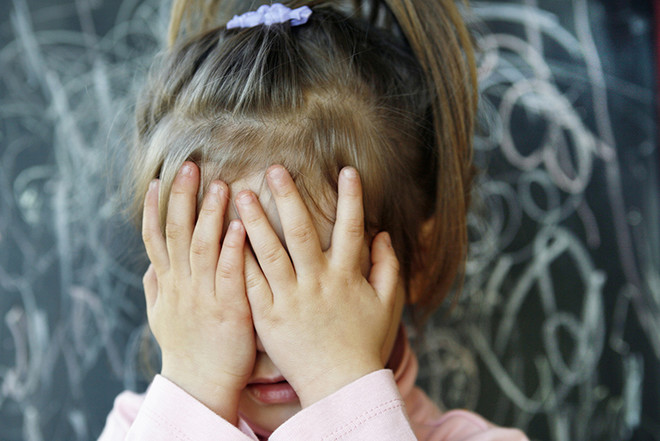Soon my son will be 10 years old. And now, for the third year already, I actively participate in his school life: I listen to his revelations about school joys, conflict situations with classmates, help with homework, go to meetings. Although once promised her husband that the school or foot. And all because after my school years of wonderful sediments, it was not at all wonderful. The fact is that my class teacher was not able to instill in us a sense of brotherhood and nurture the ability to be friends in us. For 20 years, we have not had a single meeting of graduates - no one is eager to see each other. Including for this reason, my heart squeezes when a timid son complains of trouble at school. For the time being, it seemed to me that the best way out for me as a mother was to be neutral, not to interfere in school affairs, so as not to cause new reasons for conflicts with my son in children. But recently I came across a case in the network that provoked me to consider the situation from several sides. A photo: photo bank “Lori” In one of the forums, the mother of a second-grader shared the story of her son's conflict with a classmate and asked for advice. The guys quarreled in such a way that one to another broke a notebook, tore off the cover of the textbook, ruined pencils and pens. The victim told about this to his mother - it was necessary to somehow explain why suddenly the notebooks and books were torn. All would be nothing, quarreled, reconciled, anything can happen. But after adequate communication between the parents of both, the teacher invited the injured second-grader to the conversation and, calling him a sneaky, asked not to tell her mother any more about conflicts in the school. Mom, appointed guilty, could not resist and visited the teacher with a request to explain the reasons for such conclusions. Without confusion, she replied that she didn’t have time to sort out every conflict. The post gathered hundreds of responses on whether the teacher had responded correctly to the situation and how her mother should now behave ... “Let them understand it themselves!” They say. “How will they figure it out if no one teaches them to solve conflicts?” Others retort. But what should a competent teacher do if the children are scandalous? "Without understanding the subtleties of the conflict itself and the reasons for its occurrence, we can immediately say that the teacher made several mistakes," says the school psychologist Lyudmila Marchenko. - First, she, referring to the lack of time, made it clear that she was not interested in what was happening with her wards and did not consider the experience of children important. Later, children realize that she did not become an authority for them. And adults should already understand now that in this way the teacher is trying to absolve himself of responsibility for what is happening in the classroom. Secondly, calling the child a sneak, the teacher put a label on the boy. Thirdly, it is unacceptable to conceal everything that happens in the class from the parents. So it diminishes the authority of mom and dad, and in the future such „tips“ may entail irreparable situations where parents would be happy to help the child cope with adversity, and it is too late. ”
A photo: photo bank “Lori” In one of the forums, the mother of a second-grader shared the story of her son's conflict with a classmate and asked for advice. The guys quarreled in such a way that one to another broke a notebook, tore off the cover of the textbook, ruined pencils and pens. The victim told about this to his mother - it was necessary to somehow explain why suddenly the notebooks and books were torn. All would be nothing, quarreled, reconciled, anything can happen. But after adequate communication between the parents of both, the teacher invited the injured second-grader to the conversation and, calling him a sneaky, asked not to tell her mother any more about conflicts in the school. Mom, appointed guilty, could not resist and visited the teacher with a request to explain the reasons for such conclusions. Without confusion, she replied that she didn’t have time to sort out every conflict. The post gathered hundreds of responses on whether the teacher had responded correctly to the situation and how her mother should now behave ... “Let them understand it themselves!” They say. “How will they figure it out if no one teaches them to solve conflicts?” Others retort. But what should a competent teacher do if the children are scandalous? "Without understanding the subtleties of the conflict itself and the reasons for its occurrence, we can immediately say that the teacher made several mistakes," says the school psychologist Lyudmila Marchenko. - First, she, referring to the lack of time, made it clear that she was not interested in what was happening with her wards and did not consider the experience of children important. Later, children realize that she did not become an authority for them. And adults should already understand now that in this way the teacher is trying to absolve himself of responsibility for what is happening in the classroom. Secondly, calling the child a sneak, the teacher put a label on the boy. Thirdly, it is unacceptable to conceal everything that happens in the class from the parents. So it diminishes the authority of mom and dad, and in the future such „tips“ may entail irreparable situations where parents would be happy to help the child cope with adversity, and it is too late. ” Photo:Photobank "Lori""Of course, teachers used to have more time to participate in the lives of our children, now they are overloaded with reports, papers and do not always have time to pay due attention to the situation," child and adolescent psychologist Elena Shamova joins the dialogue. - But to this day, teachers and school management are responsible for what happens within the walls of the school. However, parents should know and remember that at school children are taught, helped to acquire knowledge, and we ourselves should raise children." According to Elena Shamova, the teacher should have intervened in what was happening immediately, to find out the cause-and-effect relationships. And then tell the children that she will bring everything to the attention of the parents, who will decide how to further cope with the situation. They are the ones who have the right to evaluate the actions of children, take the necessary measures of education or punishment. The teacher should not take such steps on their own, blame or take someone's side. It is important to understand that if children complain or tattle at school, there is someone there who has already played the role of judge at least once. Having received approval after reporting last time, the child again hopes to win the conflict. And during my son's education at school, I still had to face a couple of conflict situations. In both cases, I communicated with the opposing child, which enraged the boy's mother. The conversation between us, the parents, both times reached a dead end, threats were made. "I can say with absolute certainty that there are no prohibitions on communication between an adult and someone else's child, on clarifying the circumstances of what happened between children, as well as on parental instructions that will help children sort things out and not resort to conflicts, - emphasizes lawyer Mikhail Revyakin. - However, parents should remember that children, fearing a meeting with adults, may tell lies. Therefore, in order to avoid slander, such conversations should be held in the presence of witnesses. In this case, with the teacher or school management." Over time, that mother and I came to a common point of view and made peace. And the class teacher helped the boys sort out the conflict and understand each other. And she recommended that we, the parents, interfere less often in the relationships between the children, so as to give them the opportunity to learn to live and make mistakes themselves. Well, and if necessary, turn to her and solve all the problems together. After all, you must agree, who, if not the class mother, can create an atmosphere of kindness and joy in the class, teach children friendship that will stay with them for many years? And what do you think, should a teacher interfere in children's conflicts?
Photo:Photobank "Lori""Of course, teachers used to have more time to participate in the lives of our children, now they are overloaded with reports, papers and do not always have time to pay due attention to the situation," child and adolescent psychologist Elena Shamova joins the dialogue. - But to this day, teachers and school management are responsible for what happens within the walls of the school. However, parents should know and remember that at school children are taught, helped to acquire knowledge, and we ourselves should raise children." According to Elena Shamova, the teacher should have intervened in what was happening immediately, to find out the cause-and-effect relationships. And then tell the children that she will bring everything to the attention of the parents, who will decide how to further cope with the situation. They are the ones who have the right to evaluate the actions of children, take the necessary measures of education or punishment. The teacher should not take such steps on their own, blame or take someone's side. It is important to understand that if children complain or tattle at school, there is someone there who has already played the role of judge at least once. Having received approval after reporting last time, the child again hopes to win the conflict. And during my son's education at school, I still had to face a couple of conflict situations. In both cases, I communicated with the opposing child, which enraged the boy's mother. The conversation between us, the parents, both times reached a dead end, threats were made. "I can say with absolute certainty that there are no prohibitions on communication between an adult and someone else's child, on clarifying the circumstances of what happened between children, as well as on parental instructions that will help children sort things out and not resort to conflicts, - emphasizes lawyer Mikhail Revyakin. - However, parents should remember that children, fearing a meeting with adults, may tell lies. Therefore, in order to avoid slander, such conversations should be held in the presence of witnesses. In this case, with the teacher or school management." Over time, that mother and I came to a common point of view and made peace. And the class teacher helped the boys sort out the conflict and understand each other. And she recommended that we, the parents, interfere less often in the relationships between the children, so as to give them the opportunity to learn to live and make mistakes themselves. Well, and if necessary, turn to her and solve all the problems together. After all, you must agree, who, if not the class mother, can create an atmosphere of kindness and joy in the class, teach children friendship that will stay with them for many years? And what do you think, should a teacher interfere in children's conflicts?
- Of course! It is her duty!
- It all depends on the situation.
- Not worth it. Let the children themselves decide such questions.
- Another option (in the comments).
Voted: 36And what do you think, should a teacher intervene in children’s conflicts?
- Of course! It is her duty! 52.8%
- It all depends on the situation. 44.4%
- Not worth it. Let the children decide such questions themselves. 2.8%
- Another option (in the comments) .0,0%
Voted: 36









